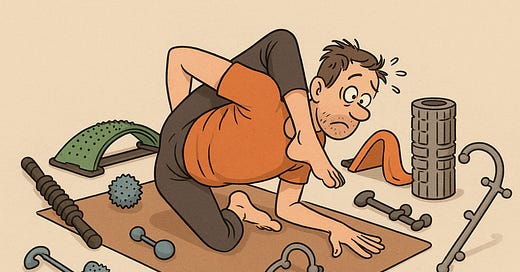How I Finally Solved 20 Years of Desk-Job Back Pain
And learned a few important, wide-ranging life lessons.
I just realized that in the last few weeks, I've been able to sit at my computer for stretches of more than an hour.
This may not look important, but for me it's a revolution.
My back has been hurting for about 20 years. I reached a point where after 20 minutes, my shoulders and neck were stiff as steel and painful. I couldn't think.
I tried everything for over a decade. The best tools or techniques only managed to alleviate the pain for a few hours.
But now, it looks like I'm permanently improving.
If you are a creator, or a knowledge worker, you can't avoid spending hours every day sitting at your desk. Chances are you feel some kind of pain.
Here's what worked for me. I hope this helps.
Just how bad was it?
By the time I was 26 and working on my PhD, I had already spent much of my life at a desk. I've been an A+ student all my life. And at around 11, I found computers...
When I was studying, I wasn't always at the keyboard. I switched between reading, writing by hand, and taking notes. That meant different positions, even if I was always sitting.
When I started the PhD, though, I spent 90% of my time sitting up straight (or at least trying), typing, and using the mouse. That's when the problems began to pop up.
Soon, by mid-afternoon, I was struggling to keep working. My upper back would get really stiff. I couldn't concentrate. This was about 15 years ago.
Things didn't improve over time. As you age, you lose flexibility. If your muscles never relax, problems accumulate.
Obviously, it wasn't sustainable. Most jobs require working at a computer nowadays. And, most importantly, everything I want to do involves a computer.
The desperate search
So, I embarked on a quest. The problem is that, when you can't be diagnosed with something specific, it's hard to get help, even from the experts.
I saw a chiropractor for a decade, maybe more. At every session, he found the same issue in my upper back, and he couldn't figure out why. So, I quit. Then I saw a physiotherapist, a personal trainer, and a posturologist.
Meanwhile, I perused YouTube, podcasts, blogs, and books (it was before ChatGPT!). I tried dozens of stretching and mobility exercises.
I did find a few high-ROI exercises that loosened the right spots. But the effect lasted at most a few hours. I was basically covering myself in band-aids that fell off too soon.
My white knight
Things changed only last year when I saw an osteopath. He predicted a couple of sessions. I think I did ten.
Every time, he adjusted something different and suggested some habits or exercises. Eventually, after fixing one part at a time, we ruled out many possible causes. Then, he made the right guess.
He recommended sitting on a proprioceptive cushion while working, and doing a balancing exercise on a larger one. The goal was to reactivate my deeper core muscles—the ones that stabilize the back. That started to work.
After a few minutes on those cushions, I felt less load on my shoulders. I could last much longer at my desk.
So, I thought, maybe my core muscles are the main culprit.
By then, I'd been doing yoga for fifteen minutes every day for over two years. It helped me start my day feeling looser, but it wasn't the fix I needed.
So, I changed my yoga routine and focused more on the core. I also paid more attention to that part of my body while doing my workouts. I learned how to really do diaphragmatic breathing, for enhanced relaxation of the core muscles.
Over just a few weeks, I started seeing permanent improvements.
My life is actually better
I thought I would have never seen similar results:
instead of struggling through pain after 25 minutes of sitting, I can go on for an hour, even more. It's a boon for deep work.
I spend less time stretching and self-massaging.
I sleep better.
I sing better! (Which helps since I lead a tribute band that plays almost every week)
An oblique takeaway
Feeling like your body doesn't want you to do the work you love makes you question your life. So, if working at a desk makes you hurt, finding a solution is THE priority.
But this post isn't to tell you: buy a proprioceptive cushion, and your back problems will disappear.
The thing is that everyone's situation is unique. That's why even the experts have a hard time helping.
Strengthening my core muscles made the difference for me. But what's important is what led me there.
First, there was a multi-year scientific process of trying tools, exercises, and treatments. But this process has been useful only because my awareness grew through it.
I learned to actually listen to my body. We are so used to always working with our heads down that we neglect our quality of life... until it's too late. Now I'm much more precise in identifying what hurts, where the pain comes from, and what's the right intervention to improve the situation.
For example, now I know that my shoulders were "compensating" for my weak core muscles. Or that my "shut off" glutes are causing pain in my knee, which is actually in the muscles, not in the joint.
A wider metaphor
My back pain experience follows a few patterns that I found multiple times in my life:
relentless experimentation,
constantly growing awareness,
hidden causes.
If you keep these in mind, you can always trust you'll make progress towards the solutions to your problems.





Of what you do and I’m not in pain. Well done!
I would be thrilled to accomplish half what